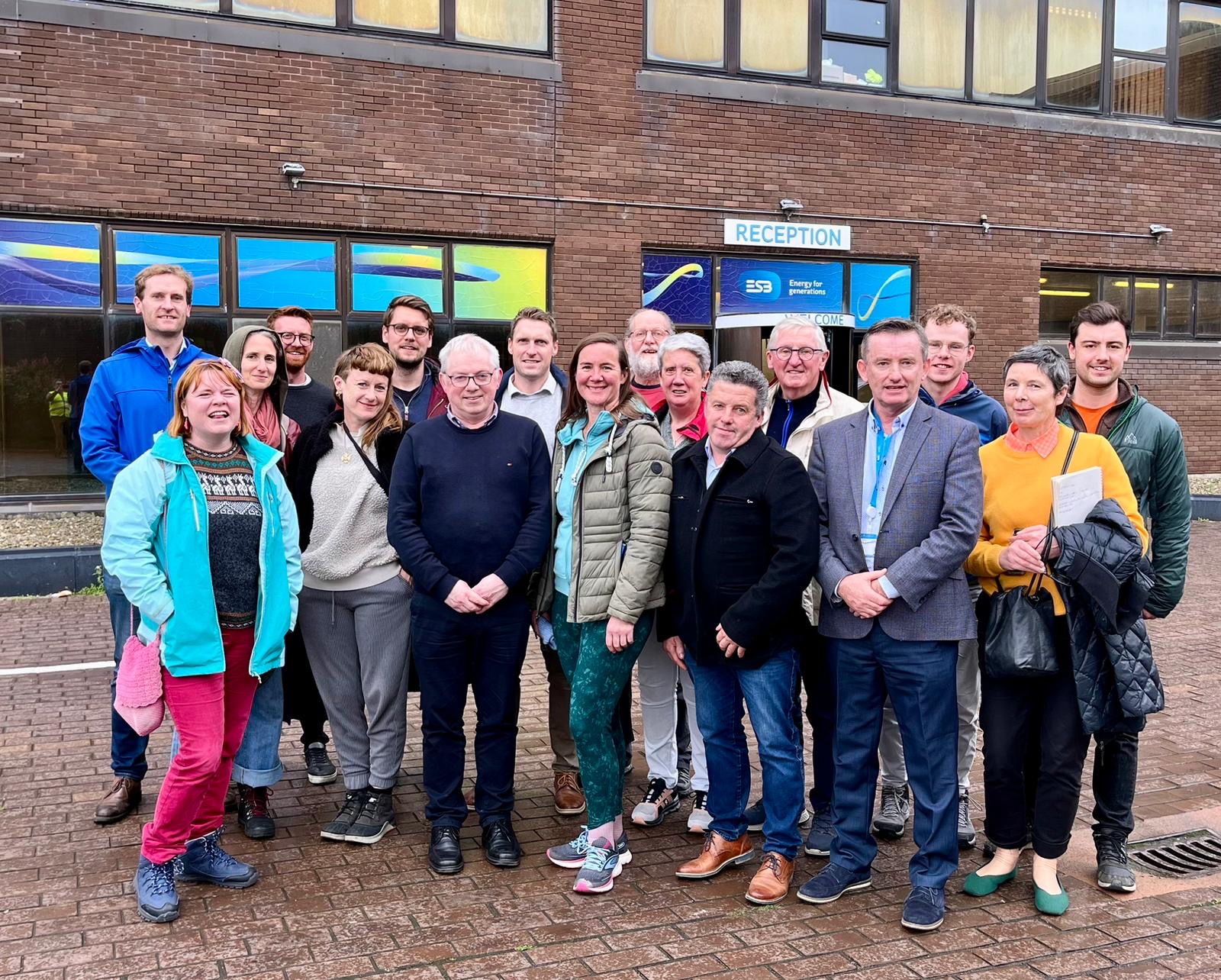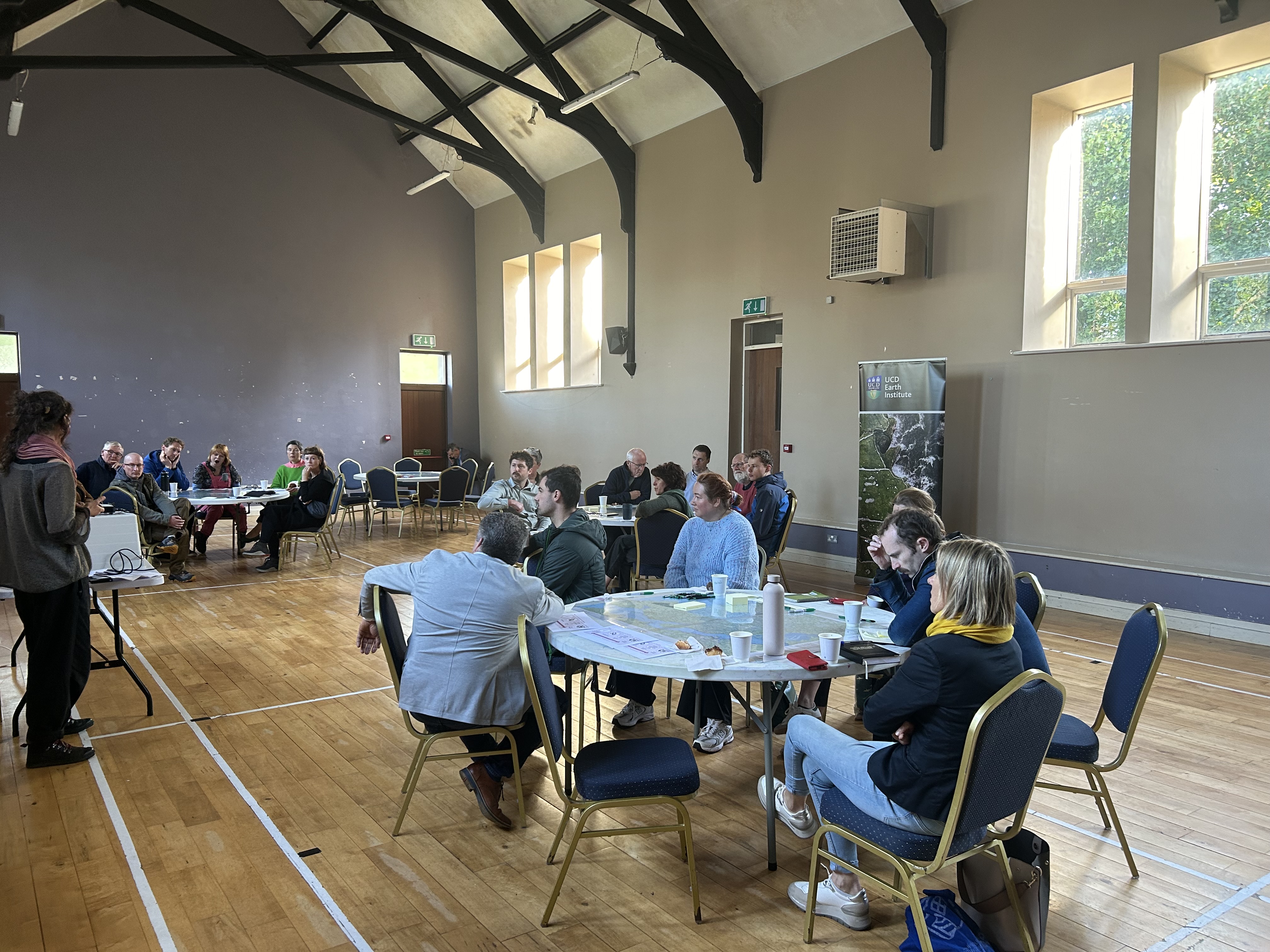Moneypoint and Kilrush: energy transition workshop
Monday, 14 October, 2024
The IE-NARR team recently organised a two-day programme of community events in Kilrush, Co. Clare, focusing on the transition from fossil fuel-based energy production to renewables at the Moneypoint Power Station, and what this might mean for people living in Kilrush and the surrounding areas.
The events consisted of a site visit to Moneypoint on Thursday, September 26th and a community workshop at the Kilrush Community Centre on Friday, September 27th.
Moneypoint site visit
A group of 15 people, including UCD researchers received a tour of the Moneypoint Power Station. ESB site manager Stephen O’Mahony and community liaison officer Sean Moroney offered an overview of the main structures in the power plant, recent investments (including the synchronous compensator helping to regulate renewable energy input into the grid) and plans for the period 2025-2029. The latter include a wind-down in the use of fossil fuels and the installation of new technologies such as batteries. Conversations were had about the new role of the plant as supplier of last resort, uncertainties regarding the longer-term of the plant, and the importance of utilising the grid connection at Moneypoint for offshore renewables.
During the site visit, we also discussed the connection between Moneypoint and nearby Kilrush, both now and in the future.

Group photo at the Moneypoint site visit
Community workshop
The community workshop aimed to further explore the relationship between Moneypoint and Kilrush in the context of the energy transition. We were joined by a wide range of people, including local residents and representatives from community organisations, local government and industry, and academia. The focus in the workshop was on knowledge exchange and co-production, with an emphasis on making community voices heard. We achieved this through three themed tables (“Energy”, “Cultural Heritage”, and “Just Transition”), as well as an “open” table. Each table had a large printed Ordnance Survey map of West Clare, and participants were invited to add their thoughts and concerns onto the maps themselves as the discussions progressed. Participants visited each of the themed tables over the course of the workshop.
Energy
Discussions for this table were led by the interests of the different groups, and guided by pillars about the future of energy in Kilrush and the role of public institutions such as the ESB within unfolding energy transitions. Industry maps of energy infrastructure in the region were provided for interactive reference, which participants were eager to connect to the wider geography and policies of energy transition in Ireland. It was agreed that Moneypoint would remain important to the energy transition, in whatever form, due to its high degree of grid and other infrastructural connectivity. Drawing directly on the Ordnance Survey map, participants recognised that all along the Shannon Estuary were industrial activities requiring alternative energies and, in many cases, presenting unique opportunities (and challenges) for sustainable transitions. One group was particularly interested in the status of Government policy and planning around offshore wind; which, we learned, was years away from actualisation under current guidelines, even those designed to streamline private offshore wind farm development. Conversations also centred around how such a transition can be better managed while presenting opportunities for jobs and development among local communities all along the estuary. At the same time, there was concern that activity in the area - especially surrounding energy - could potentially risk locking in a relationship whereby Kilrush would become a place for infrastructure that would be mostly of use elsewhere, or would only employ outside workers and expertise. Any energy projects should be embedded in the community and provide local opportunities, in whatever shape or form they are presented.
Cultural Heritage
At this table, we asked how stories about place and land, local traditions, crafts and language can help us to better understand this location and the effects that the history of energy and extraction has had on it. The discussions were facilitated by historical material from Dúchas ((opens in a new window)https://www.duchas.ie/), the National Folklore Collection UCD Digitization Project, in relation to Kilrush and the surrounding area; this included stories, anecdotes and photographs. The discussions with the three groups explored the ways in which the history of energy in this area, from the flagstone quarries and exporting of turf and timber, to the river-based industry, to Moneypoint and the current transitions, have affected how this area has developed and its role in the wider area. As stories were mapped, the importance of the river to the area became evident, and the ways in which this has affected the industries, skills and crafts which developed here. With several participants working in the area of social inclusion and equality, another thread running through the discussions was the historical disparities of wealth and the ways in which these have carried through to the present. Exploring the many facets of the histories of extraction in relation to a particular place provides insight into the complexities of creating a just transition for communities closest to energy transition.
Just Transition
This discussion was guided by the four pillars of just transition that are identified in the Irish Government’s Climate Action Plan. To begin with, we discussed whether these principles (“integrated, structured & evidence-based”; “the right skills”; “equitable impact”; and “social dialogue”) can help inform a just transition at Moneypoint and for the West Clare region. In response, participants argued that Kilrush is the economic anchor of the region, in large part because of the presence of Moneypoint, and expressed concerns that employment and services were leaving the area. It was also emphasised that this development should be understood in the context of the historical deprivation of the area. Participants argued that the timing of the just transition was critical and that it should be a wide-ranging process that also incorporates cultural, environmental, health and social factors. This could be guided by questions such as: “How can we create a good community to live in?” It was clear from the discussions that uncertainty over the direction of the energy transition (e.g., the timing of offshore renewables development in the area) was detrimental to the just transition process.
Open Table
The open table was designed to capture any topics we may have missed, while also providing an opportunity for participants to take a break from the facilitated discussions at the other tables. Key concerns shared at this table related to the direction of the energy transition and ownership over the process (“who decides?”), as well as the place of natural history in the conversation. There was mention of oyster farming, bird colonies, and the Shannon dolphins; and it was suggested that the conversation around energy should incorporate questions on human coexistence with non-human others.

IE-NARR workshop at the Kilrush Community Centre
Next steps
The maps from the workshop remain available in the local library (Kilrush from Sept. 27 - Oct. 11th; Kilkee from Oct. 14th - Oct. 25th). They will be displayed in the UCD Earth Institute after their return to Dublin. Meanwhile, we are keen to continue the conversation on energy narratives and the transition from fossil fuels towards renewable sources of energy. We will especially focus on who owns this energy, how it is used, and how it impacts the local community. The Kilrush workshop was the first of three workshops exploring these themes. The next workshop will take place in West Dublin around April-May 2025 and focus on the increasingly integrated relationship between energy transition and data centres, the infrastructural backbone of “digitalisation.”
The work in Kilrush continues as part of the Energy Narratives and Change in Coastal Communities in Ireland (ENACT) project, which is led by Josie Taylor along with a number of our colleagues at the MESSAGE interdisciplinary research group (https://www.ucd.ie/earth/message/). For anyone interested in contributing to this research, please feel free to contact Josie at (opens in a new window)josie.taylor@ucd.ie.